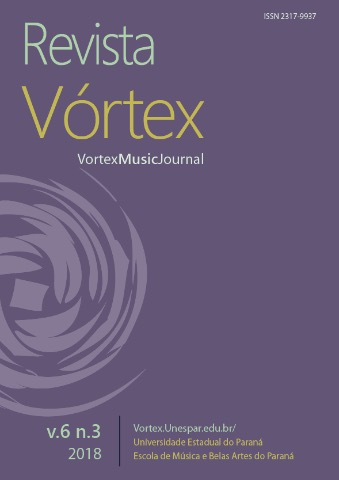Tropical(ist) Fantasies: Bossa nova and samba in contemporary Lebanon
DOI:
https://doi.org/10.33871/23179937.2018.6.3.2632Resumen
In this article, I provide an overview of the historical factors and contemporary issues that shape the presence of Brazilian music in Lebanon. I discuss the history of migration and remigration between the two countries, and how this transnational relationship has resulted in a small Brazilian population in Lebanon. I also discuss the music of Fairouz, the Rahbani brothers, and Ziad Rahbani; in particular, I examine Ziad's use of Brazilian music throughout his career. In the last section of this article, I present a case study of Xangô, a Beirut-based band who specialise in samba, bossa nova and MPB. Using ethnographic material, I outline the issues they face as professional performers, and how exoticism and stereotyping affects and shapes the production, performance and reception of Brazilian music in Lebanon.Descargas
Citas
APARICIO, Frances R., and Susana Chávez-Silverman. Tropicalizations: Transcultural Representations of Latinidad. New England: University Press of New England, 1997.
ARSAN, Andrew. Lebanon: A Country in Fragments. London: C. Hurst & Co. Publishers Ltd., 2018.
BOTHWELL, Beau. Song, State, Sawa Music and Political Radio between the US and Syria. Columbia University: ProQuest Dissertations Publishing, 2013.
GIBSON, Annie McNeill. Sambando New Orleans: Dancing Race, Gender, and Place with Casa Samba. Studies in Latin American Popular Culture, Vol. 31 (2013), pp. 99-119.
HAUGBOLLE, Sune. War and Memory in Lebanon. Cambridge: Cambridge University Press, 2010.
HOSKIN, Gabi. "˜Mapping Cultural Diversity among Brazilian Musicians in Madrid, Spain"™. In: Riley, Suzel A., and Katherine Brucher (eds.), The Routledge Companion to the Study of Local Musicking. Abingdon: Routledge, 2018.
http://almashriq.hiof.no/lebanon/700/780/fairuz/legend/music.html, last accessed 13/3/18.
KARAM, John Tofik. "˜Belly Dancing and the (En)Gendering of Ethnic Sexuality in the "Mixed" Brazilian Nation"™. Journal of Middle East Women's Studies. Vol. 6, No. 2 (Spring 2010), pp. 86-114.
KARAM, John Tofik. Another Arabesque: Syrian-Lebanese Ethnicity in Neoliberal Brazil. Philadelphia: Temple University Press, 2007.
KEIGHTLEY, Keir, "˜Un voyage via barquinho: global circulation, musical hybridization, and adult modernity 1961-9"™ in Migrating Music, Jason Toynbee and Byron Dueck (eds.), Abingdon: Routledge, 2012.
KHATER, Akram Fouad. Inventing Home: Emigration, Gender, and the Middle Class in Lebanon, 1870-1920. California: University of California Press, 2001.
KHATLAB, Roberto. "˜Libaneses no Brasil e Brasileiros no Líbano – "Brasilibaneses""™, Revista Ipsis Libanis, Vol. 1:1, 2006.
KHATLAB, Roberto. Lebanese Migrants to Brazil : an Annotated Bibliography. Zouk Mosbeh, Lebanon: Lebanese Emigration Research Center (LERC), Notre Dame University, Louaize (NDU), 2005.
KRAIDY, Marwan. Hybridity, or the Cultural Logic of Globalisation. Philadelphia: Temple University Press, 2005.
KRÜGER, Simone, and Ruxandra Trandafoiu (eds.), The Globalization of Musics in Transit: Music Migration and Tourism. Abingdon: Routledge, 2013.
LESSER, Jeffrey. Immigration, Ethnicity, and National Identity in Brazil: 1808 to the Present. Cambridge: Cambridge University Press, 2013.
NIMER, Miguel. Influências Orientais na Língua Português. São Paulo: Edusp, 2005.
RACY, Ali Jihad and Robert H. Moser. "˜The Homeland in the Literature and Music of Syrian-Lebanese Immigrants and their Descendants in Brazil"™, Diaspora: A Journal of Transnational Studies, 19:2-3 (2010), pp. 280-311.
RACY, Ali Jihad. "˜Legacy of a Star"™. Al-Mashriq.
RACY, Ali Jihad. "˜Words and Music in Beirut: A Study of Attitudes"™. Ethnomusicology, Vol. 30, No. 3, Autumn, 1986, pp. 413-427.
SEIDMAN, Steven. "˜The Politics of Cosmopolitan Beirut: From the Stranger to the Other"™. Theory, Culture and Society, Vol. 29, 2, March 2012, pp. 3-36.
SHOHAT, Ella, and Robert Stam. "˜Tropical Orientalism: Brazil"™s Race Debates and the Sephardi-Moorish Atlantic"™ in Paul Amar, The Middle East in Brazil. Indiana: Indiana University Press, 2014.
STONE, Christopher. Popular Culture and Nationalism in Lebanon: The Fairouz and Rahbani Nation London: Routledge, 2007.
TOYNBEE, Jason, and Byron Dueck (eds.), Migrating Music. Abingdon: Routledge, 2012.
TREECE, David. "˜Between bossa nova and the Mambo Kings: the internationalization of Latin American popular music. Travesia, Vol. 1, No. 2 (1992), pp. 54-85.
TRUZZI, Oswaldo. "˜The Right Place at the Right Time: Syrians and Lebanese in Brazil and the United States, a Comparative Approach"™. Journal of American Ethnic History, Vol. 16, No. 2 (Winter, 1997), pp. 3-34.
TSUDA, Takeyuki. Strangers in the Ethnic Homeland: Japanese Brazilian Return Migration in Transnational Perspective. Colombia: Columbia University Press, 2003.
ONLINE SOURCES
ABU KHALIL, As"™ad. "˜The Cult of Ziad Rahbani"™. Al-Akhbar. https://english.al-akhbar.com/node/12871. Last accessed 1/10/18
FURSAN, Eliane. Syro-Lebanese Migration (1880 - Present): "Push" and "Pull" Factors. Middle East Institute. http://www.mei.edu/content/syro-lebanese-migration-1880-present-%E2%80%9Cpush%E2%80%9D-and-%E2%80%9Cpull%E2%80%9D-factors. Last accessed 1/10/18.
KHATER, Akram Fouad. "˜Why did they leave? Reasons for early Lebanese migration"™. Moise A. Khayrallah Center for Lebanese Diaspora Studies, November 15th, 2017. https://lebanesestudies.news.chass.ncsu.edu/2017/11/15/why-did-they-leave-reasons-for-early-lebanese-migration/#_edn2]
"˜Brazilian Festival opening full of flair"™, The Daily Star Lebanon, 12th September 2017. http://www.dailystar.com.lb/Life/Lubnan/2017/Sep-12/418988-brazilian-festival-opening-full-of-flair.ashx. Last accessed 5/12/18.
Facebook advert on the Casino du Liban page: https://www.facebook.com/CasinoDuLiban/photos/a.88382722045/10154638915347046/?type=3&theater. Last accessed 1/10/18.
Official website: "˜Casino du Liban"™. http://www.casinoduliban.com.lb/about-us.php#the-company.
Last accessed 13/3/18.
"˜Show Elegancia Paris – Spectacles de Danse"™. http://www.show-elegancia-paris.fr/. Last accessed 1/10/18.
Descargas
Publicado
Cómo citar
Número
Sección
Licencia
Derechos de autor 2021 Vortex Music Journal

Esta obra está bajo una licencia internacional Creative Commons Atribución 4.0.
Los autores conservan los derechos de autor y conceden a la revista el derecho de primera publicación, con el trabajo simultáneamente bajo la licencia Creative Commons Attribution Licence que permite compartir el trabajo con reconocimiento de autoría y publicación inicial en esta revista.






